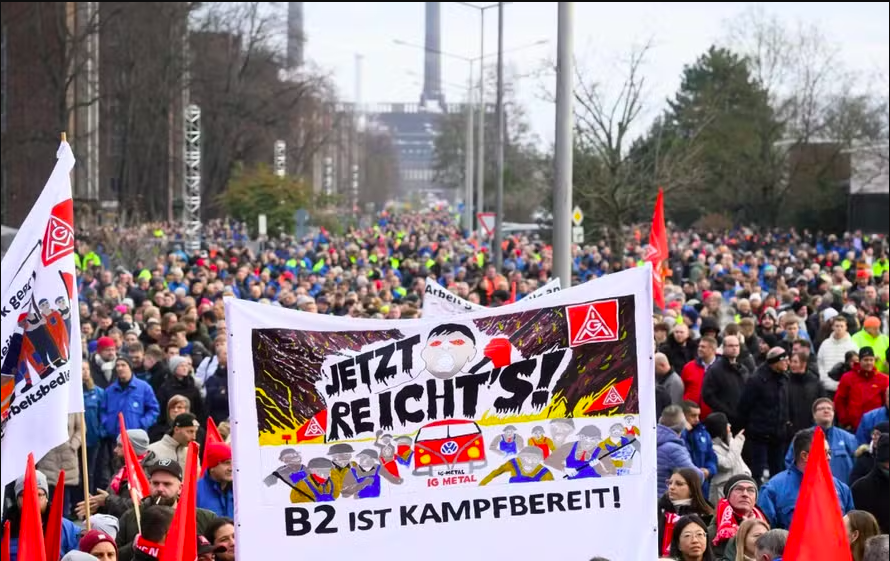
Published 17/12/2024 15:45 | Edited 12/17/2024 15:57
Negotiations between Volkswagen, the IG Metall union and the works council have reached an impasse, increasing tension between the parties and the possibility of an unprecedented strike from 2025. The last round of negotiations before Christmas, held this Monday (16), was marked by protests by more than 100,000 employees at nine of the automaker’s factories, as union leaders and company representatives try to reach an agreement on cost cuts without factory closures or mass layoffs.
Daniela Cavallo, president of the Volkswagen works council, reinforced the need for an understanding that benefits both the company and employees. “Workers do not want to enter Christmas with fear,” he declared in a speech during a rally in Wolfsburg.
Deadlock and threat of historic strike
IG Metall, the union that represents Volkswagen workers, demands that the company rule out any possibility of factory closures or mass layoffs, while the automaker’s management maintains the position that adjustments are necessary to face reduced demand in the European market. .
Thorsten Gröger, negotiator at IG Metall, said that if there is no progress in negotiations, an escalation of actions will be recommended, with warning strikes starting on January 1st. “If Volkswagen insists on drastic cuts, it will be taking responsibility for a labor confrontation the likes of which this republic has not seen in decades,” Gröger said.
Last week’s strike, the largest in the automaker’s history, has already signaled workers’ dissatisfaction with the administration’s proposals, which include the possibility of salary cuts and adjustments in production capacity.
Workers’ proposal and Volkswagen’s position
During the fourth round of negotiations, IG Metall and the works council presented a plan to cut costs without compromising jobs or factories. The proposal includes the suspension of salary adjustments for two years and cuts in the remuneration of managers and members of the board of directors.
Despite this, Volkswagen did not rule out the possibility of closing production units. Management insists on the need to achieve strict financial targets to ensure the competitiveness of the VW brand, especially in the face of growing competition from Asian manufacturers in the electric vehicle market.
History and possible consequences
The conflict takes place at a time of transformation for the automobile industry, with the transition to electric vehicles and the need for investment in new technologies. Volkswagen had already rescinded the employment protection regime in September, which guaranteed stability for factories in Germany, intensifying apprehension among workers.
If negotiations fail, unions promise a nationwide strike that could paralyze key operations at the automaker. “We are ready for a solidarity occupation of the factories,” declared Cavallo, reinforcing that the workers’ movement will be proportional to the magnitude of the cuts suggested by the company.
Both parties agreed to hold negotiations until the end of December. However, if the dialogue does not advance, negotiations will be interrupted until 2025, increasing the risk of a prolonged strike.
The dispute puts Volkswagen in a dilemma: balancing the need for cuts to secure its position in the global market without compromising its worker base in Germany, where it is based. Meanwhile, employees are waiting for an agreement that offers stability and preservation of jobs, preventing Christmas from being marked by uncertainty.
The possibility of a historic strike highlights the challenges facing Volkswagen and the automotive industry as a whole, against a backdrop of global competitive pressure and transformation.
Source: vermelho.org.br

